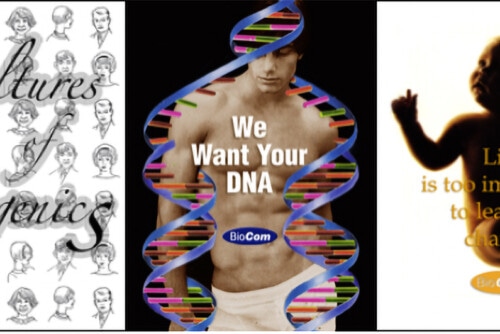In 2003 I attended the Dyke March in Toronto during that city’s LGBT Pride celebration. In conversation with a gay man I met there, I mentioned the surprising decision that the United States Supreme Court had just issued in Lawrence v. Texas.1 After years of struggle in the streets and the courts, the LGBT movement in the United States had won an important victory when that decision finally overturned all criminal laws against consensual same-sex sodomy among adults. The deflating response from my Canadian counterpart was: “Yes, we up here were wondering why that was necessary.”
That exchange stuck in my mind years later, as I considered the more recent battles over the proposed federal Employment Non-Discrimination Act (ENDA)—a bill that would make it illegal for employers throughout the United States to discriminate on the basis of sexual orientation or gender identity. ENDA has been the focus of huge battles in Congress, and among LGBT organizations, over whether to include protection for transgender and gender nonconforming employees.2 In contrast, a few years ago in France, young people took to the streets en masse and defeated an attempt to roll back employment protections that apply to all workers—protections that would eliminate the need for specific antidiscrimination legislation like ENDA.
In France, the law protects workers generally from being fired without good cause. In other words, bosses cannot just fire someone because they feel like it—they have to have a good reason. A worker who is fired arbitrarily does not need to prove that he or she was the victim of targeted discrimination. The French government wanted to create an exception to this rule; they proposed a probationary period of two years for young workers before these protections would apply. But the French people would not tolerate even that exception, and the proposal was dropped.3
Meanwhile, in the United States, a bruising battle raged among LGBT organizations over the insistence of some organizational leaders that the ENDA bill should be stripped of protections for gender nonconforming people in order for it to pass a Congressional vote. During 2007, the elites of our communities were divided over whether prohibiting arbitrary and hostile treatment of gender nonconforming members of our communities was just too much to expect.4 An observer from France might not be blamed for wondering why all this is even necessary.
In most parts of the United States, it is still perfectly legal to refuse to hire or to fire someone for any reason or no reason at all, as long as the refusal or the firing does not violate any of a list of specifically-enumerated prohibitions against employment discrimination. In general, under federal law, larger employers cannot discriminate on the basis of race, color, national origin, sex, religion, disability, age, or genetic information. Many states and localities have their own longer lists of prohibited factors. However, in general, as long as an employer is not acting on one of those specifically prohibited bases or to interfere with or retaliate because of the exercise of specific employment rights, it may treat workers in completely hostile and arbitrary ways, and there is no remedy. The principal exceptions to this general rule come from union contracts and from civil service rules in the public sector. Some states have laws or legal precedents that impose “good cause” requirements on employers under certain circumstances. But most workers in the United States spend a large percentage of their waking hours toiling for a business that has nearly unlimited control over their lives at work, and they do so because they need to put food on the table and pay the mortgage or the rent.5
So what does all this have to do with LGBT/Q politics? Isn’t the obvious answer that we need laws to protect us against discrimination on the basis of sexual orientation and gender identity or expression? Why do we need to take on the general issue of unfairness in the workplace? Isn’t that someone else’s problem? Why should we spend our time and resources as a community establishing rights for workers and limiting the power of bosses? After all, some workers and even some unions are homophobic and some bosses are queer or queer friendly. Shouldn’t we focus our energies on protecting our own? If so, what does workplace justice have to do with it?
The point of this essay is to argue that working for antidiscrimination laws is not enough, that it is in the interest of queer communities on the whole to follow a broadly conceived political agenda, and to participate actively in the workplace justice movements that can be found around the country. Put simply, given that most people look to jobs and family for money, we have to recognize that neither of these institutions gives us much economic security under current law and custom. If queer people wish to live our lives openly, we have to recognize that we need a measure of economic security to do so. Most of us do not have that degree of economic security, and antidiscrimination laws will not be enough to give us the protections that we need. Fundamentally, we have to recognize and fight for the inherent right to productive work and the entitlement to earn enough to live a happy life on our own terms. Only this kind of broader change in the basic relationships that define our positions in the workplace can give us the economic justice and stability that we need to live our lives freely as queer people.
The State of the Law
Before turning to where we ought to be going, we should consider briefly where we have been and where we are. When I first started coming out in the mid-to-late-1980s, precisely one state in the entire country had a law against discrimination in employment on the basis of sexual orientation: Wisconsin. A smattering of localities had such protections. No state or locality prohibited discrimination on the basis of gender identity or expression. As of July 2009, 21 states and the District of Columbia have laws prohibiting sexual orientation discrimination in employment, and 12 states and the District of Columbia have laws prohibiting discrimination on the basis of gender identity or expression.6 These laws were often the result of epic battles like the fifteen-year campaign in supposedly liberal New York City that did not succeed until 1986, as brilliantly documented in the movie Rights and Reactions.7
In addition to these changes in law, it is now not uncommon for collective bargaining agreements and internal company policies to have antidiscrimination policies that include sexual orientation, and, increasingly, gender identity or expression. The Human Rights Campaign (ironically, the same organization that gave a green light to the exclusion of gender identity or expression from ENDA during 2007) vigilantly monitors and cajoles Fortune 500 companies to prohibit both sexual orientation and gender identity or expression discrimination, and to provide health care coverage to meet the needs of transgender workers. HRC has developed a guide to employers on how not to discriminate against people on the basis of gender identity or expression. According to HRC, as of February 2009:
[T]hirty-five percent — a total of 176 — of the Fortune 500 businesses have protections based on gender identity, compared to just 3 of the Fortune 500 businesses in 2000. Of the top 100 Fortune-ranked businesses, 61 include protections based on gender identity. Eighty-five percent of the Fortune 500 businesses now have protections based on sexual orientation, compared to 51 percent in 2000. Of the Fortune 100, 94 include sexual orientation protections.
Eighteen of the Fortune 100 companies provide some health insurance coverage for the needs of transgender employees.8
These laws, contractual commitments, and policies represent a tremendous victory. Millions of workers in various parts of the country enjoy these protections, whatever their sexual or gender identities. They mark a shift in public policy and attitude that has enormous significance for queer workers. It affects people’s ability to get jobs and to keep them, and it sends a signal about the kind of abusive behavior that is no longer acceptable at the workplace. Many in our communities have worked long and hard so that we can enjoy these protections, and they deserve our praise and appreciation.
In addition, the growth of protected categories or factors in antidiscrimination laws has pushed more law-abiding employers to develop systems of documenting complaints by employees and criticisms by employers. The more employers worry about showing that their actions were not based on illegal factors, the more likely they are to police their supervisors and require well-documented reasons for taking negative actions against employees. The overall result has been to move some employers toward a “good cause” system, even if it is not mandated by law, as such. Yet something is still very wrong at the workplace.
Economic Insecurity and the Workplace
Having noted the great gains of the past several decades, we must take stock of where we are. First, many jurisdictions have no protections against discrimination on the basis of sexual orientation or gender identity or expression. As noted above, as of July 2009, there is still no federal law protecting us in the workplace. Second, the laws that exist have not ended discrimination in the workplace. People subject to existing protections are still fired because they are queer or gender nonconforming or both. I have seen this first hand in our employment law practice at The Legal Aid Society in New York City.
So what is going on here? There are several problems. One is that the laws do not have adequate enforcement mechanisms. In my experience, enforcement agencies are understaffed, their employees are often poorly trained, and the agencies are often reluctant to award significant damages, or at least sufficient damages to affect future behavior. Moreover, both administrative complaints to these agencies and private lawsuits can be long and difficult. It is the employee’s burden to prove that the employer discriminated against him or her illegally. The fired employee must prove, for example, that she was fired because she is a lesbian or because she is butch, and not because she failed to follow the boss’s (perhaps deliberately unreasonable and abusive) instructions, or because she “just didn’t fit in.”
Finally, and most important, the context in which these laws exist is one in which employers’ power has grown enormously since the early 1970s to the detriment of workers. Since the early 1970s, we have seen a precipitous drop in the percentage of the workforce protected by union contracts. The power of collective bargaining created vast improvements in the lives of working people, not only in the form of wages and benefits, but also in the form of employment protections and the quality of life on the job. The wages and benefits gave people access to more enjoyable and freer lives. Just as important, the protections of strong unions meant that people did not have to live and work in constant fear of the arbitrary power of their supervisors or their bosses.
Though the environment for labor organizing may be improving since the recent end of Republican dominance over national politics, the power of collective bargaining has greatly eroded since the 1970s. Unrelenting attacks by government and private union busters, acting in concert, along with unfavorable fiscal and monetary policies, placed workers on the defensive. Unionized firms break their unions by moving jobs to more union-hostile locations, in this country or elsewhere. Union organizing has often been stopped dead in its tracks through the efforts of an extraordinarily well-funded union busting industry and its allies on the National Labor Relations Board. As a result, unions represent less than 10 percent of private-sector workers and fewer and fewer public sector workers. The few unions that remain often find themselves bargaining over how much will be cut. Where there are no unions, there is no one in the institutional role of shop floor watchdog, whether that “shop floor” is in a factory, an office, a restaurant or caterer, a school, a hospital or nursing home, a theater, or anywhere else that workers work. Arbitrary and abusive conduct, no matter how illegal, has no institutional check where there is no union. If one is lucky, there is an enlightened and progressive human resources department.
Moreover, despite what we are often led to believe, education and talent do not usually substitute for collective action in giving workers voice and protection on the job. An educated or skilled worker is still a worker when it comes time to set pay or other working conditions, or to address discrimination or other forms of mistreatment on the job.
This is not to say that unions always fulfill their role of protecting workers or that they never discriminate. Unions sometimes violate antidiscrimination laws and sometimes fail to protect workers from employers’ violations. But where unions function as they should, they are a critical check on the otherwise unfettered ability of bosses to pick on people and make their lives miserable in myriad ways, no matter the laws on the books.
- 539 U.S. 558 (2003). [↩]
- H.R. 3017, 111th Congress (2009). [↩]
- See “Q&A: French labour law row,” BBC News 11 Apr. 2006. [↩]
- Compare H.R. 2015, 110th Congress (2007) with H.R. 3685, 110th Congress (2007); see “United We Stand: ENDA for All!” on Boycott HRC Blog. [↩]
- See “At-will employment” on Wikipedia for a survey of state laws on at-will employment. A range of sources are provided. [↩]
- See “Statewide Employment Laws & Policies” (PDF) map by Human Rights Campaign. As the Human Rights Campaign Web site notes, there are also several states with administrative orders protecting public employees from sexual orientation or gender identity discrimination. [↩]
- See Rights and Reactions film website. [↩]
- Human Rights Campaign Foundation, The State of the Workplace, for Lesbian, Gay, Bisexual and Transgender Americans, 2007-2008 (PDF) (Washington: Human Rights Campaign Foundation). [↩]




